第3课 咨询 Status Enquiry
Unit 3 Status Enquities
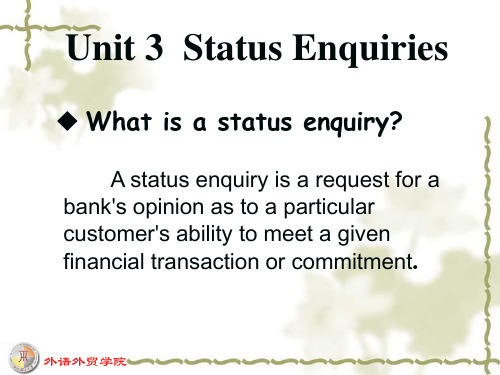
An enquiry normally asks for the accountholding bank's opinion 'as to the means and standing' of a customer, and the customer's 'trustworthiness in the way of business to the extent of ---'. The amount may be for a single transaction or series of transactions.
外语外贸学院
主要合作伙伴: ACA International KOREA Information Service MIRAE Credit Information Services Corp. Hong Kong City Credit Management Group. Advance Adjusting Associates Recoveries Management PTE, LTD Columbia Financial International League International For Creditors CHINA CREDIT INFORMATION SERVICE, LTD.
丰富的服务内容——可以为您提供全球企业资信调
查报告、国家风险及付款评估等全方位的资信服务。
外语外贸学院
遍布全球的网络——在全球范围拥有560个港、 澳及海外机构、近4000代理行,经过90年积 累已建立起多国家、多层次的高速通汇网络。 优秀的合作伙伴――我们与国际咨询机构建立 了长期合作关系,为客户提供全球企业信用 调查服务。
unit3 Enquiry..

• General inquiry • Specific inquiry
Business Letters
first enquiry
• A "first enquiry", that is an enquiry sent to a supplier whom you have not previously dealt with, should begin by telling him how you obtained his name. Some details of your own business, such as the kind of goods handled, quantities needed, usual terms to trade and any information likely to enable the supplier to decide what he can do for you, will also help.
• An enquiry, made by importers, normally shall include trading terms, delivery time, company brochure, price catalogue, sample availability, etc.
Business Letters
Credit inquiries ensure that you are dealing with trustworthy importers.
Business Letters
Methods of making a credit inquiry
• Bank reference;
• Chinese Commercial Counselor’s office in foreign countries;
unit 3 enquiry
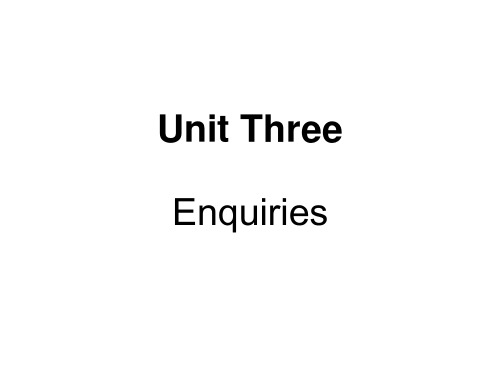
3.1 Introduction
People often need information about prices, products, services that other company can supply. They may require a quotation or an estimate for products. An enquiry is such a request for information about certain commodity or service and the trade terms as well. Enquiries are of two types: general and specific.
2.下一步说明写信的目的,比如希望对方提供什么信息或服 务等。如果不确定对方公司能否提供所需服务,应说明“如 你方不经营此项业务,请将我们的询盘转交给有关公司”。 E.G.: We shall appreciate it if you can quote us a firm offer for… Please quote us your best price and shipping date. Please submit specifications, preferably with illustrations. We would appreciate a sample of each of the items listed above. Please send us your latest catalogue with your best CIF Tianjin prices. If you do not deal in this line, please hand on our enquiry to the appropriate company.
Unit3 status enquiry

• • • •
•
•
(v.) ①to record an amount as being paid into sb’s bank account 记入借方,借入 e.g. Please credit my account with the interest on the loan. We can’t refund cash but we’ll credit you with the value of the suit. ②have trust in; trust in the truth or veracity of 信任,相 信 e.g. You won’t credit her far - fetched story.
• Assure (v.)
• • • • •
确保,保证 make certain of; cause sb to feel sure or certain e.g. The only ladder to assure success is to work hard. note: assure sb of sth; assure sb that 确保某人某事,保 证某人某事 e.g. We assure you of our reciprocating your courtesy at any time. We assure you that we will give our careful attention to your order. 放心,不要担心
• be/rest assured
• don’t worry • e.g. Please be/rest assured of the quality of the goods.
• 1.该公司现在想要代表我们公司销售缝纫机,就他们的有 关资信、业务能力以及特点的情况向贵行咨询。 • 2.兹回复贵方昨天的来信,我们很高兴的通知你提及的公 司信誉非常好。 • 3.该公司主要与美国和日本从事电器和电子产品贸易,我 方对他们的经营能力和财务状况评价很高。他们的信誉非 常好。
Unit3 status enquiry

主讲人:胡蕾
Unit 3 Status Enquiry
Vocabulary
• • • • • 1.safeguard(vt.) 保护,保卫; 防护 2.fellow (n.) 同伴、同事 3.standing credit 定额贷款 4.credit standing 信用状况 5.reference(n.) 参考,应用;(身份、能力 等的)证明书,证明人
• ①one’s financial reputation 资信,信用 • e.g. If you need more objective information concerning our credit, please direct all inquiries to the First Bank. • Remittance and collection belong to the commercial credit. • ②a sum of money in sb’s bank account 存款,存款账 户 • e.g. How much have I standing to my credit? • She has a large sum standing to her credit in the bank.
• in credit
存户结存,存款
• have money in account • e.g. My account is in credit.
• Creditor (n.)
债权人,债主
• a person to whom money is owed • e.g. His creditors are demanding to be paid. • note: credit (debit) one’s account with 借记某人的账户 ,记入某人的账户 • record in one’s account as credit (debit) • e.g. We have credited your account with your commission for this transaction. • We have debited your account with $2,000 for extra costs.
Unit 3inquiry (2学时)

on the point of executing
be on the point of doing sth., be about to do sth. I was on the point of communicating with him by paper. On being sent to hospital, he was on the point of breathing his last. It started raining when I was on the point of leaving home. The film is on the point of completion.
enquire
1. enquire for 询购某物 The goods you enquire for are out of stock. 2. enquire about 打听某事 They have enquired about the possibility of the sale of their products. I want to enquire about the quantity you require for next quarter. 3. enquire into 调查;了解 It’s our duty to enquire into this matter. The whole matter has to be enquired into.
Status
status n. position, condition credit/financial status inquiry / enquiry n. a request for information on the supply of certain goods We are pleased to have your enquiry for our car. We will send you our offer and samples on receipt of your specific enquiry.
unit-3省名师优质课赛课获奖课件市赛课一等奖课件

3. A general enquiry
Gentlemen: We learn from ABC & Co. Ltd, New York that you are a leading exporter in your in importing your goods and appreciated your sending us catalogue, sample books or even samples if possible.
Meanwhile, please quote us the lowest price, CIF Liverpool, stating the earliest date of shipment and the minimum quantity.
Should your price be competitive and date of shipment acceptable, we intend to place a large order with you.
请报最低拉各斯成本加运保费价,涉及我方 5%佣金,阐明最早旳装运期。
(1) 请报最低价。 Please quote the lowest price.
(2) 请报上海船上交货最低价。 Please quote the lowest price, F.O.B Shanghai.
Discount : 折扣 quantity discount: 数量折扣 cash discount: 现金折扣
精读英语第三课PPT词汇解析.ppt
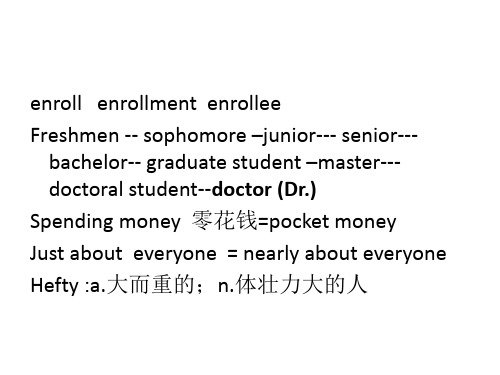
• Stock 库存 out of / in stock 脱销/仍有库存
• Surplus stock / excess inventory 库存过多
• At cost 以成本价
•
You can buy the wines at cost.
•
你可以按成本价买这几种酒
• The hungry market
• 支持呼吁 ~(for sb./sth.)
• The opportunity of a lifetime 千载难逢的好机 会
• Pass by • I can’t bear to / I can’t stand to • Miss the chance
• With a vengeance 变本加厉的;猛烈地 • After a good rest the workers set to work with a vengeance
enroll enrollment enrollee
Freshmen -- sophomore –junior--- senior--bachelor-- graduate student –master--doctoral student--doctor (Dr.)
Spending money 零花钱=pocket moneya ~ of
• Plead : v. pleaded/pled
• 恳求 ~ (with sb.)(for sth.) ~ to do
• 答辩,抗辩:to ~ of guilty/not guilty
• 找 理由,借口(n passive) ~ sth.(for sth.)
person’s appearance , character ,opinion…… ) Eg. Try to avoid making ~ remarks. Personnel 全体职员 员工 [pl.]
Unit 3 Enquiries and Replies

词组荟萃
regarding prep. 关于 I wrote a letter regarding the shipment. . 我写了一封关于装船的信。 类似的词组有: in reference to; with respect to; concerning. as regards in regard to with regard to
For your information, competition from similar makes is very keen here. Please see to it that your price is quite in line with the current market so as to enable us to secure more orders for you We are looking forward to receiving your favorable reply. Yours faithfully,
外贸函电
第三单元
主讲教师:黄霜林
Enquiry is the first step after the establishment of business. It means that in a business deal the buyer inquiries about the information of the products. Through enquiry, the buyer can know the prices of the goods and possibility of a business deal. It is usually divided into general enquiry and specific enquiry.
Unit Three Status Enquiries
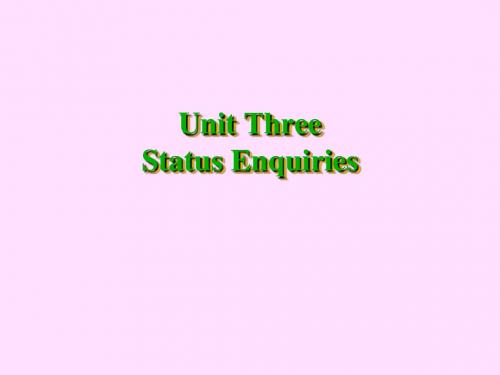
6.对你提供的任何资料,我们都予以保密。
4.The company you enquired is the most reliable importer of our region. It enjoys good reputation among business partners for many years. 5. The ...bank in your city will give you any information respecting our reputation and our manner of doing business. 6. Any information provided by you will be treated in confidence.
2.Why we need to send Status enquiry?
The above mentioned information is very important for a company to consider before it decides to enter into business relations with other firms.
3. As far as our information goes, their financial standing appears to be sound/is considered strong.
4.你们所问询的那家商号是我地区一家最可靠 的进口商。多年来在同行中享有良好声誉。 5.你地XX银行将给你提供有关我们的信誉和经 营作风等方面的资料。
4. Features of such letters
• • Usually stereotyped Some large companies use specially printed forms containing questions they would like to have answered Generally write the letter “Confidential” or “Private and Confidential” on the subject heading and on the envelope.
Unit3 Enquiry
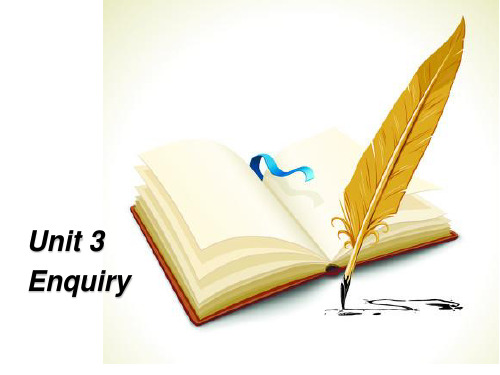
Sample letter: first enquiry
Dear sirs, We are interested in all your products, could you please send us more informaiton and samples about your products and price lists? Yours faithfully,
பைடு நூலகம்
Sample letter: general enquiry
Dear sirs, We learn fro mABC Co.Ltd.New York that you are a leading exporter in your country. We are, at present,very much interested in importing your goods, and would appreciate your sending us catalogs,sample books or even samples if possible.Please give us detailed information of CIF prices,discounts,and terms of payment. We hope this will be a start for long and profitable business relations. Yours faithfully,
Dear Sir /Madam, Thank you for your enquiry at . We are professional supplier for plush toys at competitive prices, located in Nanjing,jiangsu Province.Here is the attachment with some pictures of our products that may suit your requirements.For more,please check our website,and select the products that you are interested in. We have great interest in developing business with you.Should you have inquiries or comments,we would be glad to talk in details through MSN:lily@,mails or any way you like. Best regards,
Unit Three Status Enquiry
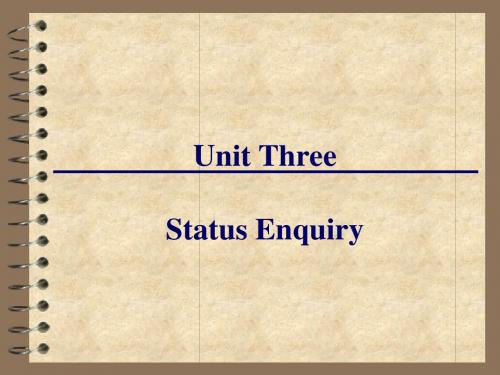
2.
3.
Useful expressions
1. We
have received---We are in receipt of your letter… We acknowledge receipt of your letter… We acknowledge your letter We have for acknowledgement your letter… We have the pleasure of acknowledging receipt of your letter… In reply to--In answer to---
Credit investigation
1. 恳请贵方尽量收集有关横滨市丰田公司的信用状况方面的材料。 Will you please be kind enough to obtain for us all information possible respecting the standing of Messrs. Toyoda & Co., of Yokohama. 2. 因为本公司正要与该公司订立某重要交易, 所以希望事先正确地了 解该公司的信用状况。 As we are on the point of transacting some important business with them, we should like to know exactly how their credit stands. 3.恳请惠予告知该公司的近邻与顾客对该公司的评价, 本人将深感谢 意。 I shall fell under great obligation if you will advise me confidentially respecting the reputation they enjoy among your neighbours and correspondents.
七年级下册英语第三课知识点总结
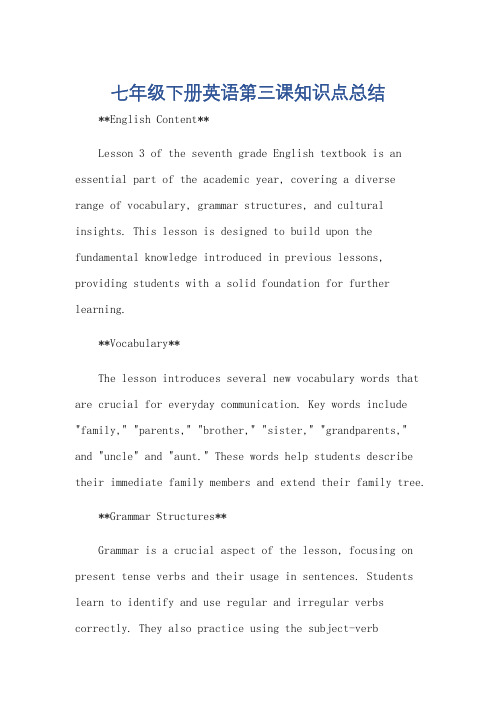
七年级下册英语第三课知识点总结**English Content**Lesson 3 of the seventh grade English textbook is an essential part of the academic year, covering a diverse range of vocabulary, grammar structures, and cultural insights. This lesson is designed to build upon the fundamental knowledge introduced in previous lessons, providing students with a solid foundation for further learning.**Vocabulary**The lesson introduces several new vocabulary words that are crucial for everyday communication. Key words include "family," "parents," "brother," "sister," "grandparents," and "uncle" and "aunt." These words help students describe their immediate family members and extend their family tree. **Grammar Structures**Grammar is a crucial aspect of the lesson, focusing on present tense verbs and their usage in sentences. Students learn to identify and use regular and irregular verbs correctly. They also practice using the subject-verbagreement, which is essential for constructing grammatically correct sentences.**Cultural Insights**Apart from language skills, the lesson also provides students with insights into different cultures. It explores the concept of family and the importance of family ties in different cultures. This cultural exploration helps students appreciate the diversity of families and the role they play in society.**Practical Applications**The lesson encourages students to apply their learning in real-life situations. Through role-plays, group discussions, and other interactive activities, students practice using the new vocabulary and grammar structures in context. This hands-on approach helps them retain the information better and improves their communication skills. **Conclusion**In summary, Lesson 3 of the seventh grade English textbook is a comprehensive lesson that covers vocabulary, grammar, and cultural aspects. It prepares students forfurther learning by providing a solid foundation in language skills and cultural understanding. With the help of interactive activities and practical applications, students can apply their knowledge in real-life situations, enhancing their communication abilities.**Chinese Content**七年级下册英语第三课是学年中的重要一环,涵盖了丰富的词汇、语法结构和文化知识。
外贸函电Unit3 Status Enquiries
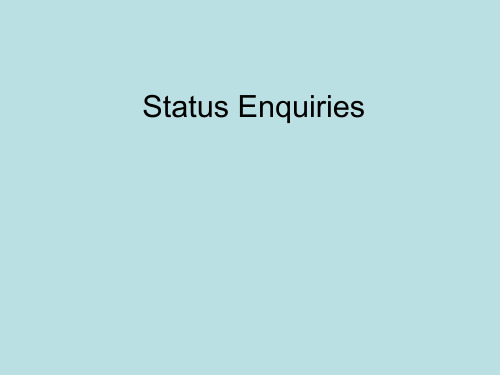
BANK OF CHINA Shanghai Branch Shanghai China
China National Import & Export Corp. Shanghai Branch Shanghai China Dear Sirs
April 10, 2004
In reply to your letter of 25th March, we wish to inform you that we have now received from the Standard Chartered Bank, Karachi Branch, the information you require. Messrs. J. A. Hussain & Co., P. O. Box 386, Karachi, was established in 1979 with a capital of $ 1,000,000. Their chief line is the import and export of machine tools and electric goods. Their suppliers’ business with them is reported to have been satisfactory. We consider them good for small business engagement up to an amount of $ 5,000. For large transactions we suggest payment by sight L/C. The above information is strictly confidential and is given without any responsibility on this bank. Yours faithfully Bank of China
第三课课文解释
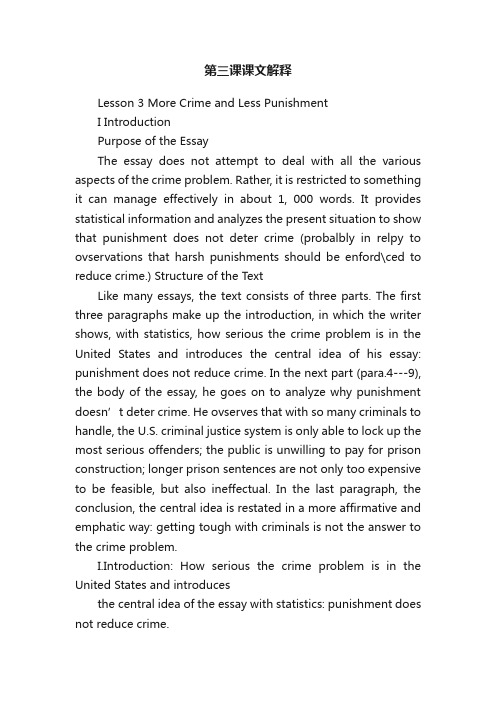
第三课课文解释Lesson 3 More Crime and Less PunishmentI IntroductionPurpose of the EssayThe essay does not attempt to deal with all the various aspects of the crime problem. Rather, it is restricted to something it can manage effectively in about 1, 000 words. It provides statistical information and analyzes the present situation to show that punishment does not deter crime (probalbly in relpy to ovservations that harsh punishments should be enford\ced to reduce crime.) Structure of the TextLike many essays, the text consists of three parts. The first three paragraphs make up the introduction, in which the writer shows, with statistics, how serious the crime problem is in the United States and introduces the central idea of his essay: punishment does not reduce crime. In the next part (para.4---9), the body of the essay, he goes on to analyze why punishment doesn’t deter crime. He ovserves that with so many criminals to handle, the U.S. criminal justice system is only able to lock up the most serious offenders; the public is unwilling to pay for prison construction; longer prison sentences are not only too expensive to be feasible, but also ineffectual. In the last paragraph, the conclusion, the central idea is restated in a more affirmative and emphatic way: getting tough with criminals is not the answer to the crime problem.I.Introduction: How serious the crime problem is in the United States and introducesthe central idea of the essay with statistics: punishment does not reduce crime.(paras.1-4)A. There are so many criminals that we do not have enough prison for any more. (para.1)B. The painful fact is that the more crime there is the less we are able to punish it. (para.2)C. We nees to think about the relationship between punishment and crime in a new way:crime deters punishment: that there is so much crime that it simply cannot be punished.(para.3)D. We can only imprison the elite group among criminals (require about five seriouscrimes) (para.4)II. The body of the essay. Analysis on why punishment doesn’t deter crime. (paras.5-9)A. These features show that it makes little sense to blame the police, judges or correctionalpersonnel for being soft on criminals. (para.5)B. A few statistics from the Justice Department’s recent report. (para.6)C. The public is unwilling to pay for prison construction. (para.7)D. Long prison sentences may not be effective in reducing crime. (para.8)E. More time spent in prison is also more expensive. (para.9)III. Conclusion: the central idea: getting tough with criminals is not the answer to the crime problem. (para. 10)Techniqies of Writing1)Statistical InformationThis is an argumentative piece of writing, in which the writertries, using clear thinking and logic, to convince readers of the soundness of his oppinion: punishment does not deter crime. In order to convince, a writer needs evidence, here, Moran chiefly uses statistical evidence, including exact statistical information (on the re-imprisonment ofparoled criminals) and approximate statistics (on the crime rate of the U.S.).2)AnalogyAnalogy is the comparison of two unlike things for the purpose ofillustration. The comparison is possible because the two things have something in common. In the fourth paragraph, the writer compares a criminal’s acceptance into a prison with the admission ofa high-school graduate to a college. The similarity is that both have to maintain certainstandards, and the standards change according to the law of supply and demand (The more candidates there are, the higher the standards for acceptance.)3)Rhetorical QuestionsThose are questions that do not expect an answer but express a strong feeling, opinion or impression. Three rhetorical questions are used in the second paragraph as a way of challenging readers, making them either agree with the writer or think why they do not.Look at these questions:But can we afford to cut off the hands of those who committed mor than 35 million propety crimes each year?Can we send them to prison?Can we execute more than 22,000 murders?Such questions achieve more effect than statementsexpressing the same ideas.4)Selective Use of RepetitionIn Paragraph 6, the structure “Of the/every…only/about, etc. …”is used five time s for emphasis. Repetition fo words and structures can be very useful if used carefully.II Tips for Teaching the Lesson1.As the students probably know too little about the American judicial system to understand theissues discussed in the essay, teachers are advised to supply a little suchi information, wither in the form of printed material, or in a pre-class talk. Or they could give what is necessay as they discuss the text. They can at the same time introduce the most important legal terms, as they go along. But don’t try to teach too much, just enough for students to understand the issues discussed.2.Crime is complicated problem for students of this level to discuss in English. An discussion atthis stage is sure to be superficial. One thing teachers can do is combine discussion of the crime problem with language training as shown in Grammar Exercies5.2), to elicit ways of dealing with crime using passive voice.III Detailed Discussion of the Text1.If you are looking for an explanation of why we don’t get tough with criminals you needonly look at the numbers.(1)If you are trying to find out why we don’t deal with cirminals severely, you can just look at the numbers---there are too many of them for the society to punish.get tough with: to become harsh, severe, unyielding with sb., e.g.The government has decided to get tough with car smugglers.The school asked the police to get tough with the neighborhood bullies who were constantly shaking the children down.2.This amounts to more than 41 million crimes, many more than we are able to punish.(1)This means that each year more than 41 million crimes are committed, which is far more than the police can handle.amount to sth.: to be wqual to, in quantity or in meaning, e.g.The seemingly polite letter amounts to a refusal.Her savings don’t amount to much.When he died, his debts amounted to fifty thousand dollars.3.The best estimates suggest that 36 million to 40 million people (16 to 18 percent of theU.S. population) have arrest records for nontraffic offenses.(1) According to the most favorable judgment, 36 million to 40 million people, amounting to 16 to 18 percent of the U.S. population, have at some time been arrested for acts of wrongdoing, not including those of breaking traffic rules and regulations.suggest: to state indirectly, e.g.His silence suggested disagreement.The figures suggest that the income of the local people is increasing.4.We already have 2.4 million people under some form of correctional supervision, 412,000of them locked away in a prinson cell.(1)In this country, there are already 2.4 million people who are receiving punishment in one form or another; 412,000 of themare serving their prison terms/kept in prison.under correctional supervision: a euphemism (=the use of a pleasanter name for something thought to be unpleasant), meaning being disciplined, or beingmade to improve one’s behavior under the control/charge of the community, etc. as a punishmentlock sb. away: (informal) to put sb. in prisonCf. lock sth away: to put sth. in a safe place and fasten the lock, e.g.She locks important papers away in a drawer.Cultural Note: in the united States, besides imprisonment, there are other forms of punishment. For example, young people who break the law can be put into a reform school/reformatory (in Britain, community home) where they receive training. Or they might be required to do community service work for a fixed number of hours.5.We don’t have room for any more!(1)The country does not have enough prisons for more than 412,000 criminals.6.This is why the certainty and severity of punishment must go down when the crime rategoes up.(2)This is why at the present moment not all crimes are punished and the punishment for crimes is less severe than before even though the crime rate is on the increase.Note the writers choice of word to contrast crime rate and the severity of punishment: go up and go down.go up: to rise, e.g.The cost of living in this city is going up.go down: to decrease, e.g.The price of dggs will go down after the Spring Festival.when: even though, in spite of the fact that, e.g.As a comedian, he had to make the audience laugh when he had just got bad news from home.7.Countries like Saudi Arabia can afford to fgive out harsh punishments precisely becausethey have so little crime. (2)afford to do sth. : (usually used with “can”, “could” and “be able to” ) to be able to do sth.without serious loss or damage, e.g.As he badly needs the job, he knows that he can’t afford to say “no” to his boss.give out: to announce publicly; (here)to enforceCultural Note: In some Islamic countries, such as Saudi Arabia and Yemen, severe punishmen is enforced on crimes of any kind. For example, murders areinvariably put to death, and pickpockets, thieves and robbers are often punished, by having their hands cut off.8.But can we afford to cut off the hands of those who committed more than 35 millionproperty crimes each year? Can we send them to prison? Can we execute more than 22,000 muderers?(2)But can we cut off the hands of those who committed more than 35 million crimes of stealing, mugging or robbery each year? Can we put all of thwm into prison? Can we put to death the more than 22,000 murderers each year? Can we do all that without arousing cries of protests?property crimes: crimes involved in taking other people’s property illegally such as stealing, mugging and robery Cultural Note: In the United States, even when the suspectinvolved in a murder case is caught, he/she is more often than not found innoce nt because the accused is held “innocent until proven guilty” and is convicted “beyond reasonable doubt”, and it is not so easy to find evidence about which no reasonable doubt can be raised.9. A decade of careful researches has failed to provide clear and convincing evidence thatthe threat of punishment reduces crime.(3)Although researches into the relationship between crime and punishment have been carried on for ten years, they can’t produce proof enough to show that severe punishment can reduce crime.that the threat of punishment…: an appositive clause which identifies “convincing evidence”fail to do sth.: (formal) to be unable to do sth., e.g.Owing to a traffic jam, they failed to reach the airport their flight.10.We think that punishment deters crim, but it just might be the other way around.(3)We think that punishment helps prevent crime, but the opposite might be true: crime prevents punishment.deter sth.: to discourage, check or prevent sth. through the threat of sth. unpleasant, e.g.A heavy fine alone won’t deter shoplifting.The university enforces severe punishment to deter cheating in exams.Cf. deter sb. From sth./doing sth.: to make sb. decide not to do sth. or contiune doing sth., esp. by making them understand the difficulties and unpleasnt results of their actions, e.g.Threats failed to deter him from continuing his research.The high prices of housing deter people from buying homes.the other way around/round: the opposite situation, e.g.To our surprise, the tiger did n’t kil l the man. It was the other way round---the man killed the tiger.He didn’t divorce his wife. It was the other way round.11.It just might be that crime deters punishment: that there is so much crime that it simplycannot be punishied.(3)The situation might be that too much makes it impossible to punish all the criminals. When 16 to 18 percent of the U.S. population commit crimes, what can you do about it?12.This is the situation we find ourselves in today.(4)This is the situation we are faced with today.find: to discover sb./sth/yourself doing sth. or in a particular situation, esp. when this is unexpected, e.g.When the old man came to, he found himself in bed at home.He unlocked and opened the drawer only to find his passport gone.He switched on the light and found a stranger standing in the middle of the room.13.Just as the decline in the number of high-school graduates has made it easier to gainadmission to the college of one’s choice, the gradual increase in the criminal population has made it more difficult to get into prison.(4)The increasing number of crimes has made it more difficul to get criminals into prison while the decreasing number of high-school graduates has made it easier to be admitted into the college of a person’s choice.Note the irony in comparing university enrollment andimprisonment.14.While elite colleges and universities still have high standards of admissions, some of themost “exclusive” prisons now require about five prior serious coimes before an inmate is accepted into their correctional program.(4)Thereis a similarity between prisons and universities in their recriting policy. You’ve got to be outstanding candidates to get into the best colleges and universitites. Similarly, certain persons for dangerous criminals only accept those who have committed fuve seruiys crunes before being convicted for the present one.elite (adj.): best, top, select, considered to be the best of their kindNote the sarcasm in this remark and the following one.15.Our corrent crop of prisoners is an elite group, on the whole much more seriousoffenders than those who were once imprisoned in Alcatraz.(4)Our present imprisoned criminal popualtion is indeed composed of first-rate criminals. On the whole, they are much more serious law-breakers than those who were put in a prison for the dangerous criminals of the country in the thirty years between the early 1930s and early 1960s.Here “elite” is used ironically.16.…it makes little sense to blame the polict, judges or correctional personnel for being softon criminals.(5)…it isn’t reasonable to critize the police, judge or those who are in charge of exercieing punishment for being too lenient/not being tough with criminals.make (little/no) sense: (not) to be reasonable, wise or practical, e.g.(It) Doesn’t make sense. Why should the power and the phone line go off all of a sudden?(Lesson 6, Book I)It makes sense to find out first how much the trip will cost.Doesn’t it make sense to back out after all we’ve done?It makes no sense to build any more shopping malls in this city.Cf. make sense: to have a clear meaning, e.g.No matter how I try to read it, his letter did’t make any sense to me.I didn’t know why he rejected the generous offer, but I all make sense now.17.There is not much else they can do.(5)Apart from what they have been doing, they can do very little.18.The police can’t find most criminals and those they do find are difficult and costly toconvict.(5)First, th epollice is unable to find most criminals. Second, it is difficult to prosecute those they have found, try them and finally get a court to declare them guilty, and it costs a lot of money to do so, too.Cultural Note: According to the judicial system of the United States, a criminal is tried by a jury who reaches a verdict of innocent or duilty. The accused is to be found guilty “beyond reasonable doubt”. This makesit difficult to convict a criminal, for his/her lawyer(s) can always raise a reasonable doubt concernign the evidence, the testimony or the reliability/trustworthiness of the witnesses. Also collectingevidence and having a trial cost a lot of money. Sometimes a trial might last months, or even years as the nine-month trial O. J.Simpson, famous American football player and actor, who was charged with murdering his former wife and her boy friend, but eventually declared innocent.19.The society demands that we do everything we can against crime. The practical reality isthat there is very little the police, courts or prisons can do about the crime problem.(5) What society requires is to do everything possible against crime, bu in reality, what can be done about the problem on the part of the police, courts or prisons is very little.20.The criminal justice system must then become as powerless as a parent who has chargeof hundreds of teenage children and who is nonetheless expected to answer the TV message: “It’s 10 o’clock! Do you know where your children are?”(5)With criminals amounting to 16 to 18 of the country’s population to deal with, the criminal justice system is a helpless as a parent who has to take care of hundreds of teenage children and make sure that they are all home at 10 o’clocn in the evening.21.A few statistics from the Justice Department’s recent “Report to the Nt ion on Crime andJustice” illustrate my point.(6)illustrate my point: to make the meaning of what I have said clearer22.Of every 100 serious crimes committed in America, only 33 are actually reported to thepolice.(6)Only 33 out every 100 serious crimes that occur in the United States are reported to the police.committed: that are committedof: from among23.Of the 33 reported, about six lead to arrest.(6)Of the 33 crimes that are reported, about 6 of the criminals involved are arrested.reported: that are reportedlead to: to result in usually sth. unpleasant, to have sth. as a result, e.g.Overwork and lack of exercise can lead to heart problems.Their last quarrel finally led to a divorce.24.Of the six arrested, only three are prosecuted and convicted.(6)Of the six criminals who are arrested, only three/half are officially brought to court/charged and found/declared quilty.25.The others are rejected or dismissed due to evidence or witness problems or are sentelsewhere for medical treatment instead of punishment.(6) What happens to the other three arrested criminals who are not prosecuted and cinvicted?Either because there isn’t dufficient evidence or no witnesses can be found, they are not proseccuted and convicted. In such cases, the court either refuses to consider their cases, or stpos examining them before a verdict is reached. Or instread of being put into prison, these criminals may be sent elsewhere for medical treatment (when they can produce proof for illness of some kind).26.Of the select few sent to prison, more than half receive a maximum sentence of fiveyears. (6)the select few: the few criminals who are carefully chosen.select (adj.): carefully chosed and limited to a small number of highest quality (the word is used ironically here)receive a maximum sentence of five years: to be sentenced to five years in prinson or less 27.The average inmate, however, leaves prison in about two years. (6)However, the prisoner of ordinary kind stays in prison for about tow years.average (adj.): of the usual or ordianry kind28.Most prisoners gain early release not because parole boards are too easy on crime, butbecause it is much cheaper to supervise a criminal in the community. (6)Most prisoners are released before they have served their sentence, not because the parole boards arekind in granting parole, but because it costs much more to keep a criminal in prison than to have thwm live under the supervision of the community.be easy (on): (informal) to be less severe; to act or proceed with caution, e.g.The school authorities are too easy on cheating.The manngement should be easy on layofffs.go/be easy on sb.: used to tell sb. not to punish or treat a person too severely, e.g.Go easy on these little children and let them enjoy themselves more.Cf. go easy on sth.: to use only a small aomunt of sth., e.g.Go easy on the salt.29.And, of course, prison officials must make room for thenew prisoners sent almost dailyfrom the courts.(6)Another reason why most prisoners gain paroles easily is thatnew arrivals keep coming in every day, so that old inmates have to make room for the new.make room for: to leave empty space for sb./sth. e.g.Please move along and make room for th old lady.Let’s take these dishes away to make room for the roast duck.30.We could, of course, get tough with the people we already have in prison and keep themlocked up for longer periods of time. (7)lock sb. up (=lock sb. away): (informal) to put sb. in prison Here the writer is bringing up an alternative. “Could” i s used to show what he says is possible.31.Yet when measured against the lower crime rates this would probably produce, longerprison sentences are not worth the cost to state and local governments.(7)If criminals werekept longer in prison, crime rates would probably go down. But when we consider the money that state and local governments have to pay for this, longer prison sentences are not worthwhile.when measured against: when longer prison sentences are measured againstmeasure sth./sb. against sb./sth.: to judge sb. or sth. by comparing them with another person or thing, e.g.He constantly measures his work against that of the best CEOs in the country.Our production costs are high, when (they are) measuredagainst the world’s advancedlevel.The co untry’s economic growth last year is impressive when measured against those ofother Asian countires.Your performance is poor when measured against the success of other salespersons.worth sth./doing sth.: deserving, e.g.The new art museum is worth a visit.The dictionary cost me 328 Hong Kong dollars. But it’s worth every penny.The movie is pretty good, but I don’t think it worth seeing twice.32.Besides, those states that have tried to gain voters’approval fo bonds to build newprisons often discover that the public is unwilling to pay for prison construction.(7)Some states want to raise money to build new prisons by issuing government bonds. They have tried but failed to get voters’ approval. This shows that the public is unwilling to pay for building more prisons. This is another reason why longer prison sentences are not feasible/workable.33.While it is not possible to know the true amount of crime committed by people releasedfrom prison in any given year, we do know the extent to which those under parole are jailed again for major crime convictions.(8)Although we can’t possibly know exactly how many crimes are committed by released prisoners in a specific year, we do know how many of those people underparol are convicted againfor serious crimes and put into jail again.to…extent: how far sth. is true or how great an effect it has34.Even if released prisoners commit an average of two crimes each, this would amount toonly 15,000 crimes prevented: a drop in the bucket when measured against the 41 million crimes committed each year.(8) Even if each released prisoner commits two crimes, this would add up to a total of only 15,000 crimes. This means that only that number of crimes would be prevented if those prisoners were locked up in prison for an additional year. But each year 41 million crimes occur. Compared with 41 million, 15,000 is avery small number.A drop in the bucket (AmE)/the ocean (BrE): an amount of sth. that is too small orunimportant to make any real difference, e.g.What we have raised is just a drop in the bucket. The project will need far more.35.This works out to more than $100,000 per crime prevented.(9)This means that it costs more than $100,000 to prevent one crime.work out to: to make a total amount of sth., add up to, e.g.The total cost of the project worked out to 10 million.36.But thereis more.(9)But that’ not all we’ve got to pay for each crime prevented.37.The first-year operating cost would be $150,000 per crime prevented, worth it if thevictim were you or me, but muchi too expensive to be feasible as a national policy.(9) …$150,000 would be worth it if there were only one person’s life, such as yours or mine, to save,but such a policy would be much too expensive to carry out nationwide.operating cost: money you have to pay to put long prison sentence into practicetoo expensive to be feasible: too expensive to be carried out38.Faced with the reality of the numbers, I will not be so foolishi as to suggest a solution tothe crime problem.(10)When I consider th ese figures, I won’t conclude the essay with a solution to the crime problem.so+adj.+as to do sth.: to such a degree, e.g.I don’t think he is so careless as to forget about this important appointment.They are not so poor as not to be able to afford a good education for their only son.39.My contribution to the public debate begins and ends with this simple observation:getting tough with criminals is not the answer.(10)This essay, one of a series discussing crime and punishment, begins and ends with the same statement: dealing with crime severely won’t solve the problem.contribution:an item that forms part of a book, magazine, broadcast, discussion, etc., e.g.His speech is an important contribution to the debate.All contributions to the conference are expected to arrive by the end of July.observation: a remark or statement, esp. one that is of the nature of a comment.IV Translation of the Text A高犯罪录率与低惩罚率如果你正寻找我们为什么不严惩犯罪分子的原因,那么你只需看看以下数据就清楚了。
Unit 3 Enquiry
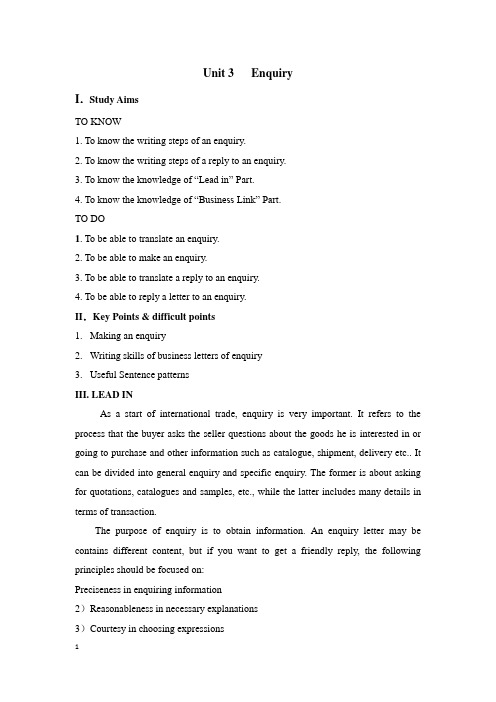
Unit 3 EnquiryI.Study AimsTO KNOW1. To know the writing steps of an enquiry.2. To know the writing steps of a reply to an enquiry.3. To know the knowledge of “Lead in” Part.4. To know the knowledge of “Business Link” Part.TO DO1. To be able to translate an enquiry.2. To be able to make an enquiry.3. To be able to translate a reply to an enquiry.4. To be able to reply a letter to an enquiry.II.Key Points & difficult points1.Making an enquiry2.Writing skills of business letters of enquiryeful Sentence patternsIII. LEAD INAs a start of international trade, enquiry is very important. It refers to the process that the buyer asks the seller questions about the goods he is interested in or going to purchase and other information such as catalogue, shipment, delivery etc.. It can be divided into general enquiry and specific enquiry. The former is about asking for quotations, catalogues and samples, etc., while the latter includes many details in terms of transaction.The purpose of enquiry is to obtain information. An enquiry letter may be contains different content, but if you want to get a friendly reply, the following principles should be focused on:Preciseness in enquiring information2)Reasonableness in necessary explanations3)Courtesy in choosing expressions4)Appreciation in proper waySince enquiry has become the general practice in international business correspondence, let’s get to know how to write it.IV. WRITING SKILLSStep 1: To state the source of the seller’s informationStep 2: To express what information or service you needStep 3: To give references about the buyer’s companyStep 4: To show the wish of further business and early replyV. Main Points of an EnquiryAn effective enquiry may includes:Opening: the purpose or reason of writing ,which is :a. the source of informationb. the intention (interest in the goods)Body: the details of requirements, which are:c. The requirements(asking for catalogues, pricelist and samples, etc. to have a general idea of the product; asking for an offer or quotation on a certain commodity);d. the introduction of market and price that will be obtained;Closing: expectation of an offerVI. Key Sentences Patterns1.Your firm has been recommended to us by ABC Co., with whom we have done business for many years.2. We have a considerable demand here for your goods.3. We would like you to send us some samples/patterns.4. We should be obliged if you would kindly send us some samples for our inspection.5. Please quote your price gross/net/FOB.6. Will you please give us detailed information of FOB prices and discounts?7. Full information as to prices, quality, quantity available and other relative particulars would be appreciated.8. We should appreciate further details/information about your product.9. Please include information about packing and shipping.10. Please let us know on what term you can give us some discount.11. For information about our company please refer to/contact ABC Co..12. In order to make us familiarized with your products, we shall appreciate your giving us the technical details of them.13. If the goods come up to our expectations, we would expect to be place regular order.14. If your prices are competitive and your goods up to standard, we shall order on a regular basis.15. We trust that you will send us your reply as soon as possible.VII. Sample LettersFrom: *******************(ABC Co., Ltd.)To: *********************(BCD Co., Ltd.)Date: Mar 15, 2008Subject: an enquiryDear Sir or Madam:We learn from Brother Co. that you are a leading exporter of table cloth.Would you please send us details of your various ranges, including sizes, colors , prices, and samples of the different qualities of material used? We are large dealers in textiles and believe there is a promising market between us. If your prices are competitive and your goods up to standard, we shall order on a regular basis.When quoting, could you give the following details:1. Terms of payment2. Discount3. Delivery time when we purchase 1000 dozen of table clothWe hope to hear from you soon.Yours faithfully,JackABC Co., Ltd. VIII. Business Link1.外贸询盘回复技巧2.询价文件涉及的主要内容3.日本兄弟公司简介IX. KEY TO PRACTICEI. Translate the following business terms or expressions.1. enjoy a good reputation2. enquiry3. learn from4. illustrated catalogue5. a promising market6. quantities at regular intervals7. a leading exporter8. after receipt of the covering L/C9. reasonable price10. look forward to receiving your replyII. Translate the following sentences into Chinese.1.请发给我们贵方的宣传手册、批发价格单以及付款方式。
英语语法知识点总结第三课
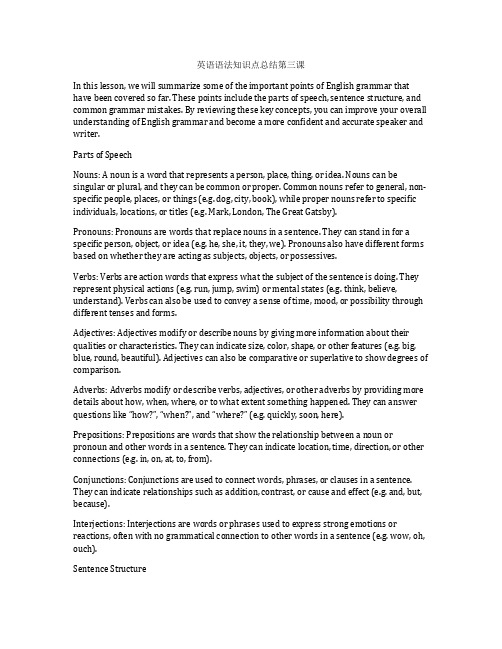
英语语法知识点总结第三课In this lesson, we will summarize some of the important points of English grammar that have been covered so far. These points include the parts of speech, sentence structure, and common grammar mistakes. By reviewing these key concepts, you can improve your overall understanding of English grammar and become a more confident and accurate speaker and writer.Parts of SpeechNouns: A noun is a word that represents a person, place, thing, or idea. Nouns can be singular or plural, and they can be common or proper. Common nouns refer to general, non-specific people, places, or things (e.g. dog, city, book), while proper nouns refer to specific individuals, locations, or titles (e.g. Mark, London, The Great Gatsby).Pronouns: Pronouns are words that replace nouns in a sentence. They can stand in for a specific person, object, or idea (e.g. he, she, it, they, we). Pronouns also have different forms based on whether they are acting as subjects, objects, or possessives.Verbs: Verbs are action words that express what the subject of the sentence is doing. They represent physical actions (e.g. run, jump, swim) or mental states (e.g. think, believe, understand). Verbs can also be used to convey a sense of time, mood, or possibility through different tenses and forms.Adjectives: Adjectives modify or describe nouns by giving more information about their qualities or characteristics. They can indicate size, color, shape, or other features (e.g. big, blue, round, beautiful). Adjectives can also be comparative or superlative to show degrees of comparison.Adverbs: Adverbs modify or describe verbs, adjectives, or other adverbs by providing more details about how, when, where, or to what extent something happened. They can answer questions like “how?”, “when?”, and“where?” (e.g. quickly, soon, here).Prepositions: Prepositions are words that show the relationship between a noun or pronoun and other words in a sentence. They can indicate location, time, direction, or other connections (e.g. in, on, at, to, from).Conjunctions: Conjunctions are used to connect words, phrases, or clauses in a sentence. They can indicate relationships such as addition, contrast, or cause and effect (e.g. and, but, because).Interjections: Interjections are words or phrases used to express strong emotions or reactions, often with no grammatical connection to other words in a sentence (e.g. wow, oh, ouch).Sentence StructureA sentence typically consists of a subject, a verb, and sometimes an object. The subject is the doer of the action, the verb is the action itself, and the object is the receiver of the action. For example, in the sentence “She eats an apple,” “She” is the subject, “eats” is the verb, and “an apple” is the object.Sentences can be classified according to their structure: simple, compound, complex, or compound-complex. Simple sentences consist of one independent clause, compound sentences have two or more independent clauses connected by coordinating conjunctions, complex sentences contain one independent clause and one or more dependent clauses, and compound-complex sentences combine elements of compound and complex sentences.Common Grammar MistakesSubject-verb agreement: This mistake occurs when the subject and verb in a sentence do not match in number (singular or plur al). For example, “The cat’s favorite food are fish” should be “The cat’s favorite food is fish” because the subject “food” is singular.Using the wrong tense: It’s important to use the correct verb tense in a sentence to indicate when an action took place. For example, “I have gone to the store yesterday” should be “I went to the store yesterday” to establish the past tense.Misplacing modifiers: A modifier should be placed close to the word it is describing in order to avoid creating confusion or ambiguit y. For example, “I only ate two cookies” could be misinterpreted as, “I ate only two cookies” if the intended meaning is “I ate only two cookies.”Run-on sentences and comma splices: Run-on sentences occur when two or more independent clauses are incorrectly joined without proper punctuation or conjunctions. Comma splices happen when two independent clauses are joined together with a comma but no coordinating conjunction. Both mistakes can lead to confusion and lack of clarity in a sentence structure.Incor rect use of pronouns: Using pronouns incorrectly, such as mixing up “I” and “me” or “who” and “whom”, can cause grammatical errors and make a sentence sound awkward or unclear.ConclusionBy taking the time to review the key points of English grammar covered in this lesson, you can develop a stronger foundation for understanding and using the language effectively. By mastering the parts of speech, sentence structure, and common grammar mistakes, you can improve your overall communication skills and express yourself more confidently in spoken and written English. Remember that practice and persistence are key to mastering grammar, and by applying these concepts in your daily communication, you can continue to refine your language abilities and become a more proficient English speaker and writer.。
- 1、下载文档前请自行甄别文档内容的完整性,平台不提供额外的编辑、内容补充、找答案等附加服务。
- 2、"仅部分预览"的文档,不可在线预览部分如存在完整性等问题,可反馈申请退款(可完整预览的文档不适用该条件!)。
- 3、如文档侵犯您的权益,请联系客服反馈,我们会尽快为您处理(人工客服工作时间:9:00-18:30)。
第3课咨询Status Enquiry教学目的要求:了解资信调查的意义;掌握作资信调查的途径、方式教学重点与难点:资信调查的方式;资信调查的途径教学时数:共计2学时(其中理论课2学时,实验课学时,习题课学时,讨论课学时)教学内容与方法:3.1Background Information3.1.1 Importance of credit inquiry.Before you start to do business with partners in foreign countries who are far away from you, if you don’t known him or her very well, then you should do credit inquiry about him or her in case you are cheated by him or her.3.1.2 How to do credit inquiry(1)through bank(2)through offices abroad(3)through commercial chamber and professional offices on credit inquiry3.1.3 Content for credit inquiry(1)政治情况:包括该公司与其本国政界关系,企业负责人参加党派等;(2)经营范围:包括业务范围、是实用户还是中间商,经营方式等;(3)资信情况:包括客户的资金、资产负债情况以及经营作风等;(4)经营能力:指客户的销售渠道、活动能力等。
3.2 Sample Letter3.2.1 Sample Letter1Dear Sirs,The Maryland, Inc.The subject company is now offering to represent us in the sale of our Sewing Machines, and has referred us to your Bank for detailed information about its credit standing, business capacity and character. We shall appreciate it if you will give us your frank opinion on thesepoints regarding the company.Any information you may give us will be treated strictly in confidence.We assure you of our reciprocating your courtesy at any time.Yours respectfully,3.2.2 Sample Letter2Gentlemen:The Maryland Inc.The subject company you inquired about by your letter of October 15, 2006, has been maintaining an account with us for the past twenty years, during which they have never failed to meet their obligation. Their balance sheets of recent years enclosed will show you that their import business in Sewing Machines has been managed and operated under a satisfactory condition.We believe that they owe their reputable position among the local wholesalers in our district to their steady and sincere way of conducting business.Please note that this information is furnished without any responsibility on our part and should be held strictly confidential.Yours truly,3.2.3 Sample Letter3Gentlemen:We have received a sudden bid from Freemen Brothers.Company, London, with which you are now doing business and the firm gives us your name as a reference.We shall appreciate it if you will let us have the following information:1. How long have you been in business relations with the firm?2. What credit limit have you placed on their account?3. How promptly are terms met?4. What amount is currently outstanding?Any information you may give us will be treated as strictly confidential and expensesaccruing from this inquiry will be gladly paid by us upon receipt of your bill.Very truly yours,3.3 Useful Expression1.The subject company is now offering to represent us in the sale of our Sewing Machines, and has referred us to your Bank for detailed information about its credit standing, business capacity and character. We shall appreciate it if you will give us your frank opinion on these points regarding the company.标题公司现提出要当我公司代理,销售我方的缝纫机,并介绍我公司向贵行了解该公司的信用、业务能力和信誉的详细情况。
如贵行对该公司就上述几点提出坦率意见,我方将不胜感激。
2.Any information you may give us will be treated strictly in confidence.贵行提供的任何资料,我方将严格保密。
3.We assure you of our reciprocating your courtesy at any time.保证随时回报贵行的好意。
4.The subject company you inquired about by your letter of October 15, 2006, has been maintaining an account with us for the past twenty years, during which they have never failed to meet their obligation. Their balance sheets of recent years enclosed will show you that their import business in Sewing Machines has been managed and operated under a satisfactory condition.贵公司2006年10月15日函询的标题公司,过去20年一直与我行有帐户往来,在此期间他们从未有过不履行义务的事情。
随函附寄的他们近几年的资产负债表,表明他们的缝纫机进口业务经营管理良好。
5.We believe that they owe their reputable position among the local wholesalers in our district to their steady and sincere way of conducting business.我方相信他们之所以能在本地区批发商中享有盛誉,要归因于他们经营业务的稳妥和诚实。
6.Please note that this information is furnished without any responsibility on our part and should be held strictly confidential.请注意,我方对所提供的资料不负任何责任。
并请对该资料严格保密。
7.We have received a sudden bid from Freemen Brothers Company, London, with which you are now doing business and the firm gives us your name as a reference.我方突然收到伦敦福利门兄弟公司的递价.该公司现与贵公司有业务往来,并把贵公司作为证明人告诉了我公司。
8.We shall appreciate it if you will let us have the following information:1) How long have you been in business relations with the firm?2)What credit limit have you placed on their account?3)How promptly are terms met?4)What amount is currently outstanding?如能提供下列资料,我方将不胜感激:贵公司与该公司业务往来已有多久?贵公司给该公司的信贷额有多大?该公司还帐是否及时?目前该公司欠帐多少?9.Any information you may give us will be treated as strictly confidential and expenses accruing from this inquiry will be gladly paid by us upon receipt of your bill.贵公司提供的所有资料,我方将以严格保密,所有费用在接到贵公司帐单后立即由我公司支付。
